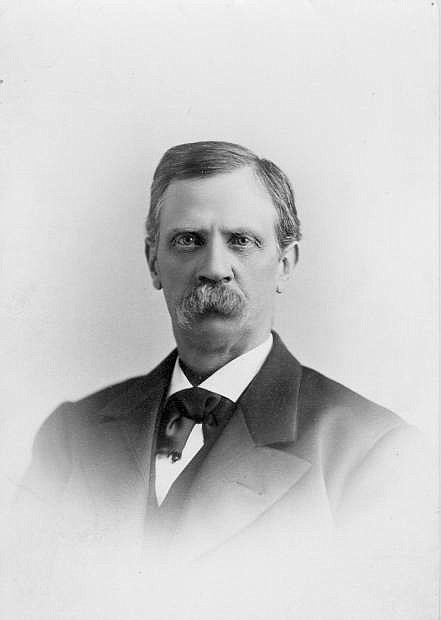Maine native Henry Mighels, 29, like many other soldiers in the Civil War, dreamt of the day he might see his love, 16-year-old Nellie Verrill, again and shared his thoughts with her through letters.
Their exchanges in written form against the backdrop of the war and Reconstruction captured private thoughts, sentiments and flirtations of a man, constantly teasing himself for seizing “stupid” or harmless behaviors missing his loved one back home.
In March 1863, from the headquarters of the 2nd Division of the 9th Corps of rapidly developing rural town Newport News, Va., Mighels asked Verrill, writing to her regularly in Norway, Maine, to send a photograph of herself as a keepsake during wartime.
“I want it for a Talisman – for the other went with me as a good angel of safety through three hot and bloody battles,” Mighels wrote.
Henry Mighels
“The young men have constructed a large skating pond on the race course near here and they have jolly times whenever the weather favors them with a temptation for making ice,” he describes in one letter.
The two, who would go on to outlast the war and ensure the Appeal would withstand any of its early competitors, exchanged their affections in these communications through 1866 that are now being recorded as part of a Special Collections and University Archives project through the University Libraries.
Special Collections librarian Donnie Curtis said with the COVID-19 pandemic, participation from others working from home has enhanced extra interest on this and a number of other projects including the Alfred Doten diaries between 1849 and 1903, the Reno Divorce correspondence and the Jon Bilbao correspondence.
The Mighels and Verrill correspondence pilot project uses the “From the Page” platform to transcribe documents and allows others to connect around the world and manage their work. Those who are authorized on any given project and provided access to certain documents can be set up to transcribe within an hour. Users can begin sifting through images of documents quickly. The documents, which are uploaded or imported from digital libraries, are given quality review, indexed and annotated.
From the Page breaks down letters written by Henry, or Harry as Verill would call him, and Nellie, into sections by months at a time. For example, five letters between March and May of 1865 by Harry comprise 30 pages that have been transcribed and can be viewed on the website individually.
The letters give a glimpse into Nellie’s flirtatiousness and Henry’s aggressiveness as they developed romantic feelings for each other from a distance, Curtis said.
“He would sometimes talk about women,” Curtis said of Mighels. “There was this undercurrent. He ended up being so busy with the newspaper. … He would go up to Maine and fetch (Nellie). Henry didn’t want her to travel alone.”
Mighels, previously working for four California newspapers from 1856 to 1860, became editor of the Appeal in May 1865 and co-owner with Marshall Robinson on Nov. 28 that year. Mighels eventually was elected state printer in 1868 and defeated for reelection two years later and left to work for a San Francisco newspaper, and by then the Nevada Daily Appeal had been renamed the Daily State Register. The newspaper would undergo a series of names in its history until assuming its current name, the Nevada Appeal, in 1947.
Verrill, later becoming Mighels Davis, was inducted last year into the Nevada Press Association’s Hall of Fame since she would become the first woman to cover the Nevada Legislature. She eventually assumed the publisher role of the Appeal at 35 years old in 1879. Henry Mighels had died of cancer at 49 and Nellie Mighels married Samuel Post Davis, who had taken over the paper. Henry and Nellie Mighels’ son, Henry Mighels, Jr., became editor in 1898 for at least 30 years. Mighels Davis died in 1945 at 101.
Curtis said the early letters between Mighels and Verill are fascinating, showing some risk-taking on her part coming to Nevada.
“She was responsible for raising her two younger sisters, and she had to leave them behind,” Curtis said.
Curtis added Verill often felt nervous about whether the couple might reach their wedding day as they continued to write each other.
“He ended up being so busy with the newspaper that he was always planning to come to Maine, but he could never get away,” Curtis said. “To leave the newspaper for so long, (he) kept trying to arrange it and it didn’t work out.”
Curtis said the project has been a fascinating glimpse into the lives of the Appeal’s early founders.
“People want to, they love to do it because the letters are interesting,” she said. “We’ll come across a phrase that’s really mysterious, from some fairly well-known writer like (Henry) Longfellow. They’re fun.”
